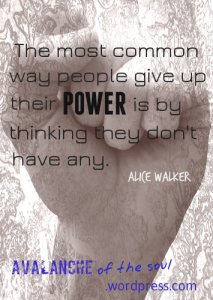Everyone living with domestic violence or abuse needs coping and survival strategies – so why are they so hard to talk about?
I regularly hear from women struggling with domestic violence or abuse. Sometimes they just need someone to listen, and sometimes they need advice. For me, the hardest conversations are with those seeking help to cope with life inside their destructive relationship. Every fibre of my being screams to urge them to run far, fast.
 An Avalanche reader recently requested I write an article on how to survive inside an abusive relationship. I was about to refuse – I cannot implicitly encourage people to remain in a dangerous situation, and I know there’s no way to transform an abusive relationship into a safe one. But then I remembered, we survivors don’t need someone else telling us what to do. We survivors don’t want to be lectured on how to make a safe exit, or cajoled into ending a relationship that we haven’t yet decided should be buried at the crossroads with a stake through its heart.
An Avalanche reader recently requested I write an article on how to survive inside an abusive relationship. I was about to refuse – I cannot implicitly encourage people to remain in a dangerous situation, and I know there’s no way to transform an abusive relationship into a safe one. But then I remembered, we survivors don’t need someone else telling us what to do. We survivors don’t want to be lectured on how to make a safe exit, or cajoled into ending a relationship that we haven’t yet decided should be buried at the crossroads with a stake through its heart.
The truth is that sometimes, we really don’t feel there is a way out for us. Or, we’re not ready to leave yet. We catalog the reasons we can’t escape:
- The kids need their dad
- I cannot survive on my own
- My family will disown me if I ask for a divorce
- I love him
- He’ll change
- I have no money, and nowhere else to go
- If I try to end it, he’ll kill me
- I need him
- He needs me.
Sometimes the barriers are real, enormous, as intimidating as trekking the Antarctic in ballet pumps. Sometimes they are obstacles that we ourselves fling across the path to freedom, because – strange as that sounds – we’ve lived with abuse for so long and revolved our lives around his needs for so long, it seems impossible to imagine there could ever be anything else. Every survivor I know has felt this way.
Embed from Getty ImagesCoping with an abusive relationship
When we live with abuse, we develop a range of coping and survival strategies. Some are positive, entailing proactive behaviour to mitigate harm or diffuse risk. Some are negative, and will cause us more harm. Here are some thoughts to consider about the most common strategies:
- Don’t get drunk and don’t do drugs. Self-medication may numb the pain with a comforting fuzzy haze, but it will also impair your judgement and dull your intuition, making you more vulnerable. Some perpetrators use this against their partners: they may report you to Social Services as an unfit mother, or advertise your drunkenness to convince others that you are inventing stories of being abused, or that you are the abusive one. Just don’t do it.
- Do avoid any triggers that you know will set him off. This is won’t stop him from abusing you, as he will look for other excuses, but it may buy you some abuse-free time.
- Don’t cut yourself off from your support network. Abusive men and women use isolation as a tactic to prevent us from seeking help, and will deliberately try to alienate your friends and family – or make it impossible for you to have them in your lives. Even if it’s a secret phonecall, a birthday card or a once-in-a-blue-moon catchup, do what you can to keep the lines of communication open. You need other people more than you may know.
- Do squirrel away whatever cash you safely can into a secret escape fund. Should you decide to leave, you may be leaving behind your home and possessions. You’ll need some money to help you get out and move on. At the very least, you’ll stop him from squandering it and feel a little better if you have kept something back for yourself.
- Don’t kid yourself that the children aren’t affected by the abuse you suffer. They are. Be kind to them. Protect them. They need you.
- Do be kind to yourself. The abuse is not your fault. You are not to blame. Don’t believe him when he lays that responsibility on your shoulders. Try to carve out some time for yourself, where you can feel safe and think.
- Don’t give up work or have babies. The abuse won’t stop if you stay home all day, or if you have another child. Giving up work means giving up any shred of financial independence and increases your reliance on him (which is exactly what he wants). Pregnancy, a time when women are especially vulnerable, often acts as a trigger for abuse – and keeping you pregnant can be a tactic for a man desperate to close off all escape routes.
- Do make a safety plan. This can help reduce your risk whilst in the relationship, and also if you decide to leave.
None of these strategies will effectively protect us from harm, but there is one thing you can do to become safer and happier…
Find your reason to leave
We can always find a reason to stay. But our boiling point comes when we realise that the multitude of obstacles and motivations that keep us locked in an emotionally and physically devastating situation are outweighed by a single truth that cannot be obliterated by fists or threats or emotional blackmail:
We have an inalienable right to a life that is free from avoidable pain. Nobody has the right to abuse us.
That’s when we start looking for the exit. And, when my words help someone find the door and walk through it, I feel like:
 What advice would you give to someone who’s not yet ready to leave an abusive partner? Which of these strategies have you used? Please SHARE in the comments.
What advice would you give to someone who’s not yet ready to leave an abusive partner? Which of these strategies have you used? Please SHARE in the comments.



To the don’t have babies point: One of the things he tried to do was get me pregnant. As much as I wanted to have a baby, it would have been hell having him as the father. I got on the depo shot. No pills to miss, no condoms to fail. Planned Parenthood will not turn you away if you can’t pay and they are discreet.
LikeLike
Very sensible approach Constance, and I agree with your point that in such a situation getting contraception in secret is a good idea.
LikeLiked by 1 person
Pingback: Domestic violence coping and survival strategies | youaretheworldtome·
I appreciate your writings so much. I’m so glad you wrote this article it really speaks to me. The mistake I made was leaving my employment after 30+ years (he said “we’ll be okay”). The economy tanked (2008) and I haven’t had steady work since.
LikeLiked by 1 person
I’m glad that the article resonated with you. I feel for your situation regarding work. I left a great job because of my abusive ex, at a time when there were barely any jobs left in my industry. He insisted he’d look after us, but actually did nothing of the sort.
LikeLiked by 1 person
Yikes. Why are they like that? What did I or you or anyone do to these guys for them to take it out on you or I. What 8 wrong with these idiots?
LikeLike
Great questions! There are various reasons why men are abusive, but the root cause in my view is that they hate themselves and women in equal measure. And what do we do to deserve it? Absolutely nothing.
LikeLike
Pingback: استراتژیهای مقابله و بقا در برابر خشونت خانوادگی – کارزار·